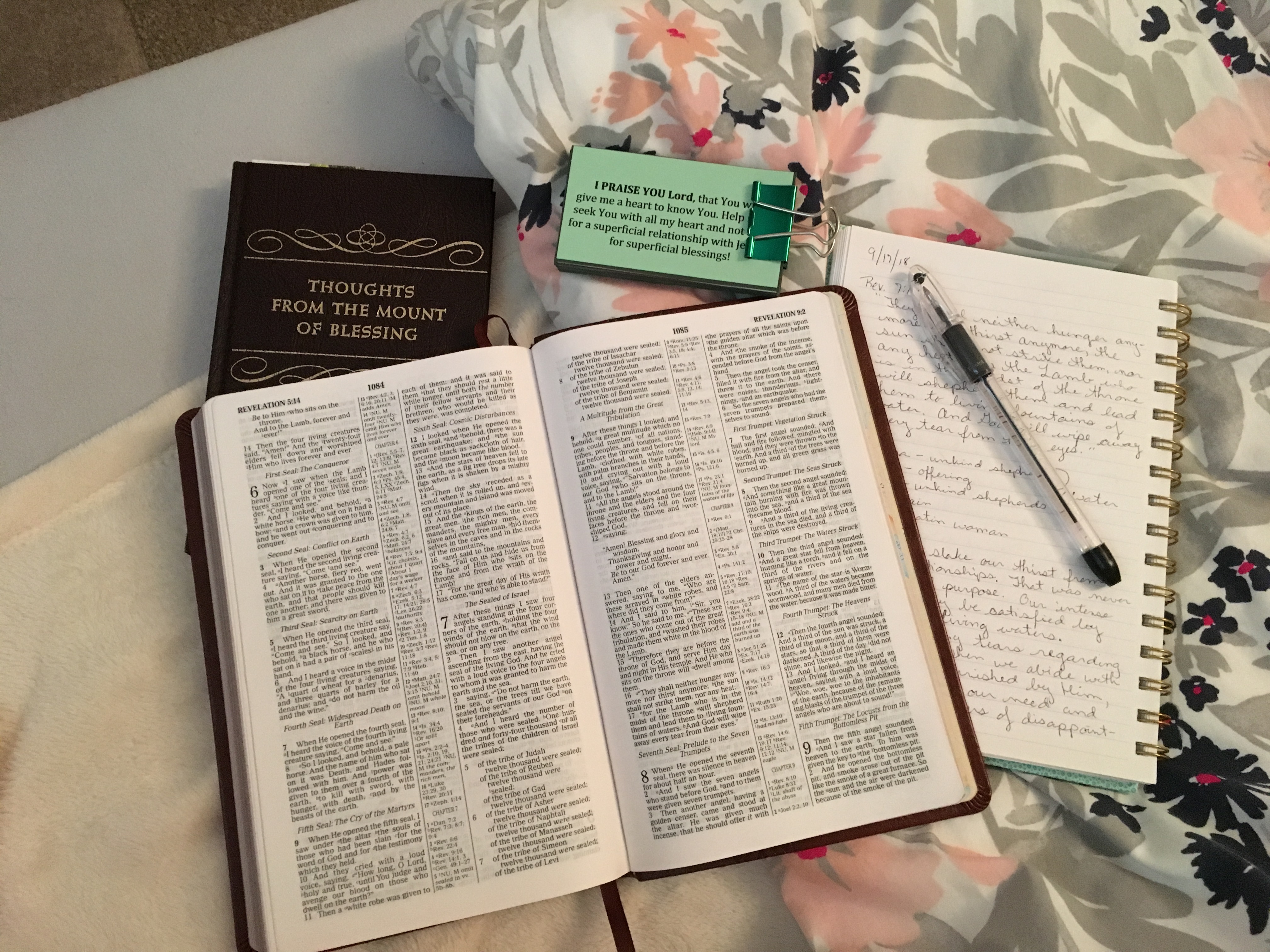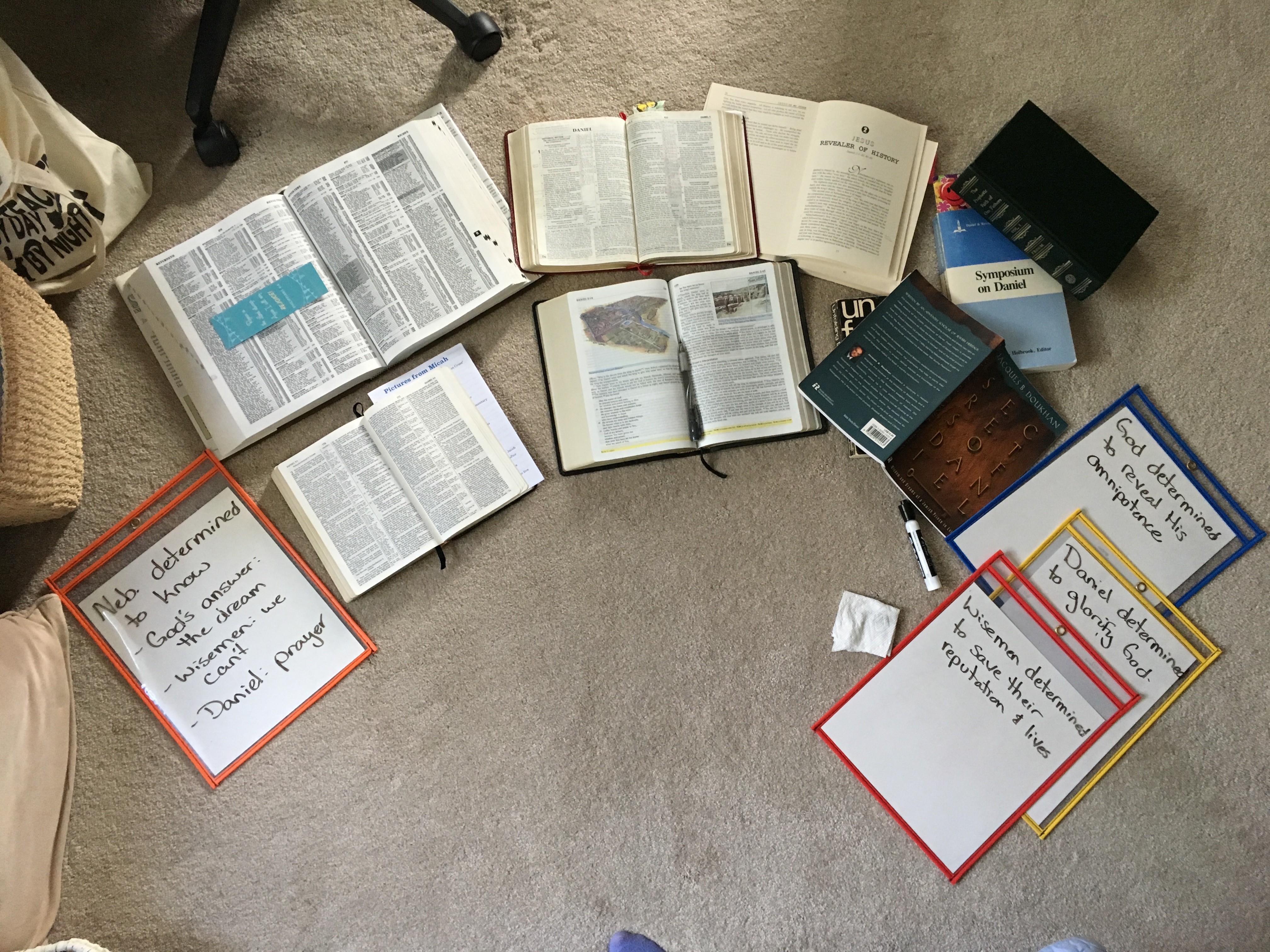When I first announced that I would be writing posts about Bible study, a friend asked me what I considered the difference between reading and studying. I told her that I addressed that in my first post: “Bible Study Foundations”. But upon reflect, I don’t think that I actually answered the question, so here is my answer. Intensity.
Let me take you on a “tour” of my reading/study routine.
Every morning I begin with private devotions that lasts for about an hour. This time is occupied with a number of methods of interaction with God.
- I pray. Often I use the Praying the Word: Prayer & Promise Cards available in the Prayer Resources at Revival and Reformation (revivalandreformation.org). I find these helpful first thing in the morning when my brain is still waking up.
- I read from a book that encourages a relationship with God.
- I read a portion of a book of the Bible that I’m focusing on. Currently, that is Revelation because I am listening to a series of lectures on Revelation. As a read I consider how the passage connects with other portions of scripture. Sometimes I’m surprised by what I read; as I mentioned in my post this Wednesday on the book of Micah. I take notes and sometimes write the kernel of what will eventually become a blog article or sermon.
- I read a number of devotional thoughts that friends post on Facebook. I don’t begin here because Facebook can be distracting, but after I’ve prayed, read, and pondered for almost an hour my mind is in God’s narrow way. I enjoy reading what others have found in their morning devotional time. I often share something that I learned in my time. Sharing is an important part of my reading/studying.

That is my early morning. During breakfast I listen to three chapters from an audio Bible I have. This helps me maintain a familiarity with the whole of scripture. You see, I have a mild form of dyslexia and read very methodically. Listening is often easier for me, but I don’t get the depth from listening because I don’t stop the audio to think about what I’ve heard.
For evening worship, we read a Psalm or a chapter from Proverbs and re-read the three chapter from our morning devotional, often from a different translation. (At the beginning of this year, my mother and I decided to read through the entire Bible together in a year. It has been a real blessing.) I enjoy this reading because by repeating what we’ve already heard the impression of the verses is deepened. Then we often discuss what we’ve read.
So that is my reading routine. A few years ago I never would have thought that I would be reading Scripture this much, but I love it. The more I read, the more I want to read and understand God’s Word.
That understanding is where study comes in.
Study is an increased focus and intensity. (You can notice from the picture that I like to sit on the floor while I study.) The subjects I study often come from my reading. Over the next few months I am reviewing my study of Daniel as I prepare a series of sermons. Let me walk you through my study “kit”:
- Several Bible translations
- Study Bibles that provide historical background and notes on certain verses by Bible scholars
- My concordance with a Hebrew/Greek dictionary
- Books on the topic (if I have any)
- On line references (For example, I’m studying about the covenant of salt mentioned in Leviticus 2:13, Numbers 18:19, and 2 Chronicles 13:5. I’ve looked up some information on salt, articles written about the covenant of salt, etc.)
- Notebooks or dry-erase board (I prefer my dry-erase boards because I can spread them out and see everything in once glance.)

As I mentioned in my very first post, I learned to study this way by studying in high school and college. If you’ve not been in an environment that required rigorous study, you might find that you’re not sure have to even get started. Let me assure you that if you are seeking God with all your heart, you will find Him. Next, you may trying studying one way: word study for example (which I will talk about in a later post) and find that you are lost or board. Then try something else.
Read books about Bible study methods, attend a class on how to study the Bible, read blogs, etc. You will find the setting, tools, timing, and focus that is just right for you.
One thing that people often don’t consider is what they are going to do with the result of their study. I suggest that you pray and ask for an opportunity to share what you’ve learned. You don’t have to give a sermon, teach a class, or write; but you might share it with a friend, post it on Facebook, or make a comment in a Bible study you attend. No matter how you share, you will be blessed if you do.




